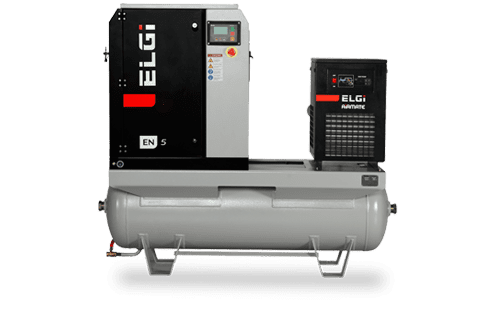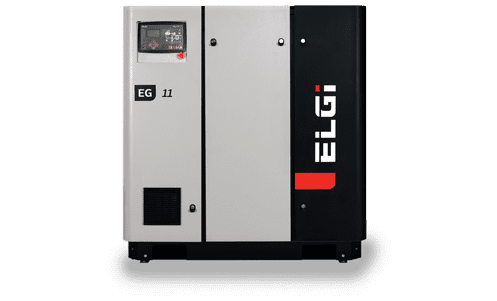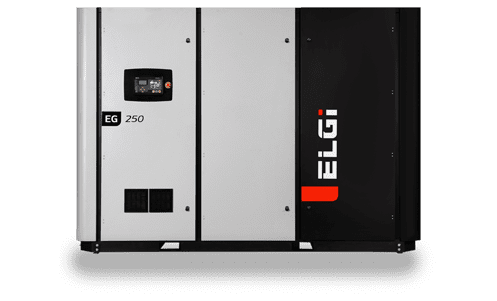Tips for Optimizing Compressed Air Systems

Power consumption accounts for approximately 70% of an air compressor's lifetime cost, significantly impacting overall energy usage. This fact is well-established and highlights the importance of managing power consumption in compressed air systems. Moreover, due to their efficiency, air compressors have become essential equipment in various industries, such as healthcare, pharmaceuticals, food, and beverage. In these sensitive industries, the reliance on compressed air makes it an indispensable part of the factory setup, further emphasizing the need for energy-efficient practices in air compressor operations.
Here are some techniques to optimize your air compressor system's energy efficiency, which can help you achieve cost savings and contribute to sustainability efforts.
Energy Saving Tips:
There are numerous possibilities available to decrease the energy consumption of compressed air systems, starting with an assessment of your air usage and conducting an air audit. To assist you in monitoring your electricity expenses, we present eleven valuable recommendations from experts.
Adjust Pressure Levels:
Operating under pressure can be challenging. Notably, for each increment of one bar in pressure, there is an associated surge in power consumption by approximately 7%." To optimize energy usage, set your air compressor at the lowest pressure possible for a specific application. Keep in mind that simply increasing pressure won't compensate for any pressure drops caused by leaks, faulty piping, or clogged filters within the system. Installing a pressure regulator can provide better control, while regular calibration of pressure gauges at quarterly intervals ensures accurate readings and efficient operation.
Timely Filter Replacement:
Replacing air filters maintains air quality and presents an energy-saving opportunity. Delaying filter changes can lead to detrimental effects and increased costs. Clogged filters can cause pressure drops and hinder overall system efficiency. Ensure timely service and replacement of air filters to maintain a healthy and energy-efficient compressed air system.
Invest in Pre-Filters:
Pre-filters, also known as coalescing filters, offer multiple benefits. They help purify the air by removing oil and water and also eliminate a certain amount of particulate matter. Installing pre-filters for air suction and cooling can extend the lifespan of your compressor and its consumables. Pre-filters improve efficiency and energy savings by ensuring cleaner air intake.
Regular System Cleaning:
Besides maintaining air quality, thoroughly cleaning your compressed air system every few months is essential. Accumulated sludge, dust, or grime can significantly impact system efficiency. Pay attention to compressor coolers and heat exchangers, as blockages can hinder heat dissipation and strain the system. Consider investing in a dedicated low-pressure air compressor and airline for cleaning purposes, as this specialized equipment can efficiently clean the system while saving power.
Selecting The Suitable Dryer:
Choosing the right-sized air dryer for your compressed air system is critical. It is crucial to ensure that the dryer's energy consumption is proportional to the demand. An oversized dryer can significantly contribute to your electricity bill. Therefore, carefully assess your requirements and select an appropriately sized dryer to achieve energy efficiency and cost savings in your compressed air system.
Consider a Variable Frequency Drive (VFD):
When it comes to screw compressors, running them under full load is essential. However, if your usage pattern tends to vary, incorporating a Variable Frequency Drive (VFD) into your system can lead to a significant reduction of up to 35% in energy costs. A VFD allows for precise regulation of energy consumption based on fluctuations in demand, ensuring optimal energy efficiency. ELGi's VFD has proven to be highly beneficial, delivering maintenance and energy cost savings of up to 25% for clients, with an impressive payback period of as little as 7 months.
Proper Sizing and Maintenance
Ensuring your air compressor is correctly sized for the specific application is important. Oversized compressors result in energy wastage, while undersized ones may struggle to meet demand, leading to increased wear and tear.
In addition to that, regular maintenance plays a critical role in ensuring that the air compressor operates at its best. Conduct routine checks for leaks, which can lead to significant air losses. Keep filters clean to prevent pressure drops and ensure proper lubrication of moving parts. By right-sizing and maintaining your air compressor, you can minimize energy consumption and extend the system's lifespan.
Prevent Air Misuse:
Remember, wasted air equals wasted money. Invest resources in training your employees on efficient compressed air management practices. Establish and maintain detailed maintenance logs, regularly updating them with any abnormalities or identified leaks in the system. Take a systematic approach to label and tag leaks, prioritizing their repair and prompt plugging.
Reuse Heat Energy:
It is well-known that heat is generated during the air compression process. However, if not utilized effectively, this heat energy goes to waste. Surprisingly, over 90% of the heat produced can be recovered and repurposed to heat air or water within your facility. Implementing a heat recovery system allows you to tap into this valuable resource, enhancing overall energy efficiency and reducing waste.
Conduct an Air Audit:
Engaging in an air audit allows your company to collaborate with industry experts and gain invaluable insights into the utilization of compressed air within your plant. ELGi's air audits offer a comprehensive energy management plan tailored to your needs. Over the years, our expertise and tailored solutions have helped numerous businesses save millions of dollars in energy costs.
Compressed Air System Design:
Proper design and layout of compressed air systems are critical for energy efficiency. Consider factors such as pipe sizing, minimizing pressure drops, and optimizing the use of storage tanks. Efficient piping layouts reduce resistance and pressure losses, allowing air to flow smoothly. Additionally, installing demand-side controls and compressed air storage systems can help manage peak demands, reducing the need for running multiple compressors simultaneously. By focusing on system design, you can enhance efficiency and minimize energy waste.
By implementing the energy-saving tips, businesses can achieve significant energy savings. Remember, assessing your current system, conducting regular maintenance, and seeking professional guidance can help identify specific areas for improvement.
ELGi’s EG series air compressors
The EG Series screw air compressor is a highly reliable and energy-efficient solution by ELGi. It has been widely installed across more than 120 countries and various industries, earning a reputation as a trusted and dependable partner due to its exceptional uptime performance. Moreover, the EG Series rotary air compressor is backed by an industry-leading warranty plan, ensuring peace of mind for customers.
For detailed information on the available warranty plans in your region, we recommend contacting your nearest ELGi representative.
Speak with our knowledgeable air experts to learn more about the EG series and its cutting-edge features.





